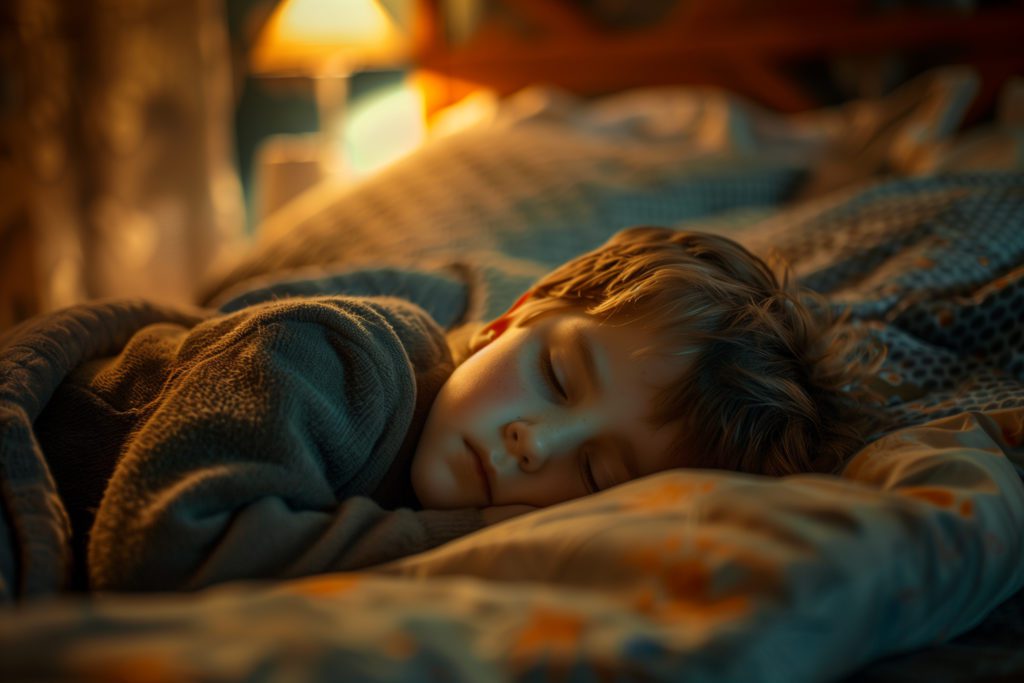
Weekend Sleep with Children: Family Sleep Strategies
Learn how staying up late affects both adults and children, even when you sleep in to compensate for it. Then, explore weekend sleep strategies.

Weekends are looked forward to by all. The rigid schedules go out the window, and there’s the freedom to stay up late and sleep in. However, while this may be enjoyable at the moment, it can have some lasting effects, and not necessarily good ones.
Staying up late on the weekend, even when you sleep in afterward, can throw off your circadian rhythm for days, making it harder to fall asleep when Sunday night rolls around. These effects are even more significant in children.
Families must band together to preserve their sleep, even on weekends, and implementing some key strategies can help your kids stay well-rested all week (and weekend) long.
Staying Up on Weekends: A Decision with Lasting Repercussions
It may seem all too appealing to forget about your (and your kids’) normal bedtime when the weekend is finally upon you in favor of staying up late to watch a movie or attend an event. What’s the harm in it, anyway, when you can just sleep in the following morning?
There may be more harm to shifting weekend schedules than you think.
How Your Body Responds To Changing Weekend Schedules
Whenever you stay up later than normal, it feels to your body like you’re shifting time zones, which can be a significant disruptor to your circadian rhythm. The longer you stay up, the worse it is.
Have you ever struggled to go to sleep on time Sunday night after staying up all weekend? That’s because your circadian rhythm has been disrupted.
Your circadian rhythm is your body’s internal clock that runs on a 24-hour schedule. Its most important role is to regulate your sleep/wake cycle, and just like any other clock, consistency is key. When you stay up late, your body no longer knows when to be asleep and when to be awake.
It’s common in society to keep a consistent sleep schedule during the week only to forego it on the weekend and start all over the next week. Unfortunately, by the time your body starts to get back into its rhythm, it’s soon the weekend again, and chaos once again sets in.
What about if you sleep in and still get the same amount of sleep (or even more)?
While staying up late may not seem like a big deal if you sleep in as well, even if you’re getting enough sleep, the disruption to your circadian rhythm may impact the quality of your sleep, meaning the sleep you do get may be poor quality, leaving you feeling less rested.
With Children, Consistency is Key
Not only can staying up make it harder for children to fall asleep or sleep well, but it can also make them less likely to want to go to sleep, creating greater friction during the week when they need to go to bed early.
The simple fact is that children don’t do well with a lack of consistency. They like to know their routine as it allows them to feel like they have more control over their life. Furthermore, they grow to expect sleep at the same, predictable times, and if they don’t get it, they can become overtired and irritable.
The truth? This can also happen to adults, so it’s best for the entire family to follow the same weekend sleep schedule. You may even find that, when you’re consistent with your sleep, even on weekends, you no longer accumulate as much sleep debt during the week because you aren’t having those changing bedtimes, which then eliminates your desire to sleep in—you’re already getting all the sleep your body needs during the week.
Getting enough sleep each night is more important for you and your child than catching up on sleep during the weekend. As for how to keep your weekends well-rested, here are some family sleep strategies.
Family Sleep Strategies for the Weekend
Even on the weekend, preschool-aged children still need 10-13 hours of sleep, and school-age children need 9-11 hours. To help them get this sleep, even around a busy weekend, try out these strategies:
Keep The Same Schedule
Children sleep better when each day brings the same bedtime and wake time, so be sure to have them follow the same schedule, even on the weekend. You can also benefit from following the same schedule, not just your kids.
Get Outdoors
Exposing your child to natural light and spending time outdoors, especially in the morning, can help to get their circadian regulated and may even make it easier for them to fall asleep at night or for any naps they take.
Add Calming and Relaxing Activities Before Bed
To help prepare your child’s body for sleep, join them in some relaxing activities before bed, such as listening to soft and calming music or reading a book. Avoid stimulating activities before bed, like playing video games or watching TV.
We Had A Late Night, Now What?
It’s unrealistic to expect that you’ll always be able to adhere to your child’s sleep schedule—life gets in the way, and that’s okay. Maybe a family member is visiting from out of town, or there’s a local ceremony to celebrate the season. Whatever the reason, your child won’t always be able to go to sleep when you want, and sometimes, even if you’re back home in time, they may be too wired to settle down enough for sleep.
Instead of avoiding anything that may keep you and your family out late, it’s best to have a plan in place for when it does happen—because it will.
These tips can help you navigate a late weekend night and make the recovery as easy as possible:
- Accept that the next day, your child will be cranky. Just like you feel irritable when you don’t get enough sleep, so will your child. Know, going in, that it will happen, and prepare to have extra patience so that the next day isn’t harder than it needs to be.
- Get outside. The key is to get your child back on schedule as quickly as possible, and sunlight can help.
- Plan for an earlier bedtime the next night. Nip the sleep debt in the bud by planning for an earlier night the very next night. Ensure that your schedule is clear to allow for it—it’s best to avoid two late nights in a row if possible.
- Get up earlier on Monday. Monday morning will likely be harder than normal if your child has a late night on the weekend, so plan to get up early so your child doesn’t have to rush out of the house so quickly. This will allow their morning to go more smoothly, which can set the right tone for their day.
Sleep is crucial for the entire family to have a great day, and by prioritizing sleep, even on the weekends, you can continue making joyful memories with your family and ensuring your children have all the sleep their growing bodies need.

Written by
Jessica G
Medical writer freelancer who has written hundreds of articles on varying topics. Masters of Engineering degree in Biomedical Engineering.
Download Pillow
Get help
Press & News
Legal
Connect
X (Twitter)
Company
Copyright © Neybox Digital Ltd.



